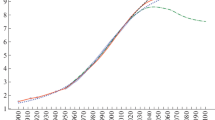Abstract
Investigations have been carried out into the basic implications of the decisions taken in December 2015 at the Paris conference of the countries–participants of the UN Framework Convention on Climate Change for the world energy and for the atmosphere and climate. Based on the studied historical record of specific CO2 emissions in the energy production by different countries, it is shown that the implementation of the Paris Agreement will require an unprecedented effort to modernize the global energy sector; in particular, rapid elimination of coal from the global energy mix and a substantially increased share therein of carbon-free energy sources (hydro and nuclear power and alternative renewable energy sources (renewables)) to one third by the middle of this century. We have developed a scenario for the global energy demand mix corresponding to the guidelines of the Paris Agreement and its more conservative variant extending the trend of the last 15 years. It has been established that, under any of the development scenarios, the global mean temperature is to exceed the level of 1.5°C as soon as within a few decades. Using model simulations of the changes in the atmosphere and climate, we show that even the full implementation of the Paris Agreements will not prevent the increase in average global temperature by 2°C as compared to the preindustrial levels. The world community faces a difficult choice between the implementation of more stringent measures for reducing greenhouse gas emissions, which we believe to be almost unreal, and adaptation to utterly new climatic conditions, which will last for centuries to come.
Similar content being viewed by others
References
L. A. White, The Evolution of Culture: The Development of Civilization to the Fall of Rome (McGraw-Hill, New York, 1959).
V. V. Klimenko, “Energiya, klimat i istoricheskaya perspektiva Rossii” (“Energy, climate, and historical perspective of Russia”), Obshchest. Nauki Sovrem., No. 1, 99–105 (1995) [in Russian].
V. M. Slivko, Energeticheskie aspekty razvitiya drevnikh tsivilizatsii (Energetic Aspects of Development of Ancient Civilizations), (Gazoil press, Moscow, 1999) [in Russian].
Climate Change 2013: The Physical Science Basis, Ed. by T. F. Stocker, D. Qin, G.-K. Plattner, M. Tignor, S. K. Allen, J. Boschung, A. Nauels, Y. Xia, V. Bex and P. M. Midgley, (Cambridge University, Cambridge 2013).
Intended Nationally Determined Contributions. Compilation as Communicated by 1st October 2015 (UNFCCC, New York, 2015).
V. V. Klimenko, A. V. Klimenko, and A. G. Tereshin, “Test of developing long-term forecasts of world energy impaction on The Earth’s atmosphere,” Izv. Atmosph. Oceanic Phys. 51, 138–147 (2015).
V. V. Klimenko and A. G. Tereshin, “Unconventional gas and transformation of the global carbon balance,” Dokl. Earth Sci. 453, 1113–1116 (2013).
A. G. Tereshin, A. V. Klimenko, and V. V. Klimenko, “Golden age of gas and its impact on the world energy, the global carbon cycle and climate,” Thermal Eng. 62, 311–321 (2015). doi 10.1134/SOO40363615050124
C. P. Morice, J. J. Kennedy, N. A. Rayner, and P. D. Jones, “Quantifying uncertainties in global and regional temperature change using an ensemble of observational estimates: the HadCRUT4 dataset,” J. Geophys. Res. 117, No. D08101, (2012). doi 10.1029/2011JD017187
V. V. Klimenko, “Why is global warming slowing down?” Dokl. Earth’s Sci. 440, 1419–14221 (2011).
V. V. Klimenko, A. V. Klimenko, T. N. Andreichenko, V. V. Dovgalyuk, O. V. Mikushina, A. G. Tereshin, and M. V. Fedorov, Energiya, priroda i klimat (Energy, Nature, and Climate), (Mos. Energ. Inst., Moscow, 1997) [in Russian].
V. V. Klimenko and A. G. Tereshin, “World power engineering and global climate after the year 2100,” Thermal Eng. 57, 1035–1041 (2010).
M. New, D. Liverman, H. Schroder, and K. Anderson, “Four degrees and beyond: The potential for a global temperature increase of four degrees and its implications,” Philos. Trans. Royal Society. Ser. A 369, 6–19 (2011).
J. Rogelj, J. Nabel, C. Chen, W. Hare, K. Markmann, M. Meinshausen, M. Schaeffer, K. Macey, and N. Höhne, “Copenhagen accord pledges are paltry,” Nature 464, 1126–1128 (2010).
Author information
Authors and Affiliations
Corresponding author
Additional information
Original Russian Text © V.V. Klimenko, A.V. Klimenko, O.V. Mikushina, A.G. Tereshin, 2016, published in Teploenergetika.
Rights and permissions
About this article
Cite this article
Klimenko, V.V., Klimenko, A.V., Mikushina, O.V. et al. To avoid global warming by 2°C—mission impossible. Therm. Eng. 63, 605–610 (2016). https://doi.org/10.1134/S0040601516090020
Published:
Issue Date:
DOI: https://doi.org/10.1134/S0040601516090020




